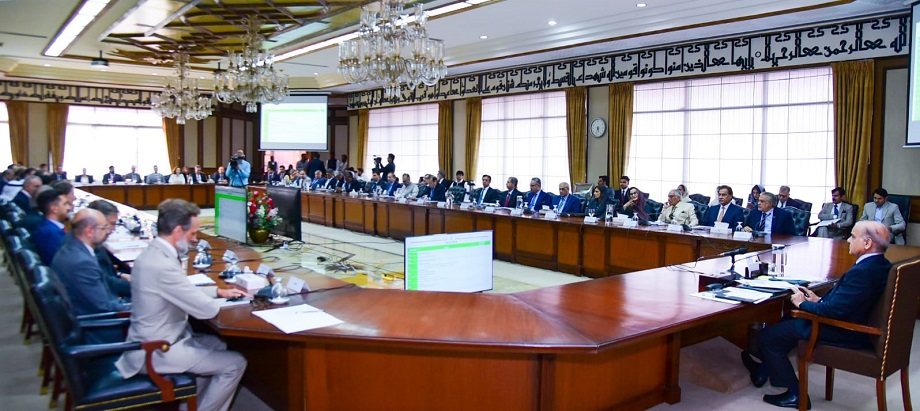Islamabad, April 01: The Prime Minister’s Office (PMO) has instructed ministries to take necessary actions on proposals submitted by the business community during recent meetings with Prime Minister Shehbaz Sharif.
During a session on March 10, 2025, the Prime Minister highlighted the government’s progress in achieving broad-based economic recovery, as reflected in macroeconomic indicators.
He emphasized that the benefits of stability were becoming visible and reiterated his commitment to fostering sustainable growth rather than repeating past cycles of economic booms and busts.
He assured the participants that he highly values consultation in shaping economic reforms.
Economy Poised for Growth
The Prime Minister stated that in ongoing negotiations with the IMF, the Fund had suggested lowering targets, but he remained committed to meeting them through better enforcement and implementation.
He encouraged the business community to invest and assured them of his full support for economic prosperity.
The IMF has reportedly revised the annual revenue target from Rs12.97 trillion to Rs12.33 trillion—a reduction of Rs640 billion—due to slower-than-expected economic growth and inflation.
However, the tax-to-GDP ratio target of 10.6% remains unchanged.
Business Community’s Recommendations
Several business leaders put forth recommendations to facilitate economic growth:
Mian Abuzar Shad praised the government’s economic recovery efforts and urged for lower interest rates, improved trade transparency with China, resolution of UAE visa issues, reduced tax rates, amnesty for capital investment, and clearance of container backlogs at Lahore Dry Port.
Khalid Usman called for resolving delays in customs valuation, supporting corporate farming, pooling agricultural machinery, and providing quality seeds for small farmers.
Rehman Waseem acknowledged rising textile exports but raised concerns about slim profit margins, high energy prices, and financing difficulties for export-oriented industries.
Khwaja Shahzeb Akram proposed the establishment of a Pharmaceutical Industrial Zone, regulatory oversight for cosmetics and nutraceuticals, and support for local industries in obtaining FDA approval.
Shahid highlighted rising transportation costs and a shortage of skilled labor.
Ehsan Malik, CEO of the Pakistan Business Council, advocated for equitable taxation and improved ease of doing business.
Kamran Arshad recommended launching an Export Financing Scheme (EFF), reviving cotton production, enforcing currency controls, and implementing a long-term textile policy.
Azam Farooq requested solutions for border issues at Torkham and Kharlachi, policy continuity, tax base expansion, and improved railway cargo connectivity for Khyber Pakhtunkhwa.
Kamal Amjad urged the withdrawal of provincial infrastructure cess, reduction in federal withholding tax, and access to international lab testing facilities.
Government’s Response
In response, the Prime Minister invited ministers and officials to address the concerns:
Minister for Planning, Ahsan Iqbal assured that the government is working on resolving visa issues with Gulf countries.
Minister for National Food Security, Rana Tanveer Khan stated that an Agriculture Transformation Plan is being developed, targeting a doubling of cotton production to 10 million bales.
Finance Minister, Senator Muhammad Aurangzeb confirmed that business community proposals are under review for potential inclusion in the next federal budget.
Minister for Petroleum emphasized the government’s commitment to policy continuity and predictability for businesses.
Minister for Power, Sardar Awais Leghari noted that electricity from the national grid is available at US Cents 7.6/kWh and urged industries to respond to Service Level Agreements (SLAs) from power distribution companies. He also mentioned that “Wheeling of Power” rates are being finalized, likely around Rs12/kWh.
Minister for Railways, Hanif Abbasi assured that connectivity issues in KP and Balochistan are a top priority.
Special Assistant on Industries, Haroon Akhtar Khan stressed that preventing capital flight requires addressing its root causes rather than enforcing stricter currency controls. He is working on a one-window solution and long-term financing for industries.
Chairman FBR, Rashid Langrial announced that Lahore Customs has been directed to clear the backlog of 684 containers at Lahore Dry Port by operating in double shifts, including weekends.
Prime Minister’s Directives
The Prime Minister emphasized that the current IMF program should be the last one for Pakistan.
He is personally overseeing the development of sectoral roadmaps and assured that the business community’s recommendations will be incorporated into policy planning.
He directed ministries and divisions to resolve private sector issues promptly and committed to reviewing and implementing viable proposals from these engagements.









